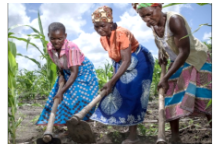Beyond Productivity: Self-Sufficiency for Women Farmers
The Challenge. The world is facing complex, interrelated crises of environmental degradation, hunger and inequality. About one in 10 people live in extreme poverty, without the means to shape a better tomorrow. The poorest in the world are undernourished, without basic services and have little access to agricultural resources and education. Climate change and a worsening global food crisis put them at even greater risk of sickness and death. So what can we do about it? CARE knows how to empower women farmers and start changing this dynamic. Using evidence gained and lessons learned over decades, CARE has pulled our “greatest hits” into one program approach. Our Farmer Field and Business School (FFBS) strategy puts women farmers in charge of testing improved techniques and build the skills they need to make the best investment decisions for their fields and families. They learn sustainable agriculture practices and find solutions to cope with climate change, improve family nutrition and transform the gender inequality that had trapped them in poverty.
The Facts About Global Poverty and Hunger. Over the past two decades, the number of natural disasters has increased 83%, extreme temperature events by 232%, and economic impact from climate-related disasters by 82%. We can’t defeat hunger and malnutrition by doing business as usual. Extreme poverty is increasing for the first time in a generation because of climate change, the effects of the COVID-19 pandemic and the war in Ukraine.
• Approximately 9.2% of the world’s population faced chronic hunger in 2022, compared with 7.9% in 2019, while the cost of delivering food assistance is at an all-time high due to increased food and fuel prices.
• Looking ahead to 2030, the World Bank projects that about 600 million people – 7% of the global population – will live in extreme poverty, missing the U.N. Sustainable Development Goal 1 target of reducing extreme poverty to below 3%.
At CARE, we are working to turn the tide, helping vulnerable people – especially women farmers throughout the world – build sustainable livelihoods and withstand shocks.
The Solution. In 34 countries, from Guatemala to Thailand, CARE uses our proven FFBS methodology to increase women farmers’ productivity, profitability, resilience and informed decision-making. FFBS is a hands-on, learning-by-doing extension approach. Women farmers meet regularly during the cropping cycle to experiment on group-managed demonstration plots and learn about new agricultural techniques that they can adapt in their own fields. The approach also helps women farmers build the collaborative skills necessary to become successful businesspeople, accessing inclusive markets and selling at competitive prices. We also use dialogue sessions to engage men and village chiefs to become gender champions, helping to change the traditional systems and mindsets that keep women farmers and communities from reaching their full potential.
Currently, CARE’s FFBS programs are improving the lives of more than 1 million farmers and their families. Evaluations testing the effects of FFBS show an increase in the adoption rate of good agricultural practices, an increase in yields and income/savings of farmers, and a reduction in environmental degradation. For every $1 invested, FFBS gives a $31 return in just three years – and those returns will keep growing.
• In Ethiopia, the “hungry season” declined from eight months a year to less than four for project participants – even during the country’s worst drought in 35 years.
• In Ghana, our support of off-season vegetable gardens in targeted communities has decreased the hungry season from 144 days a year to just seven.
• In Tanzania, we helped 10,000 farmers grow more soybeans and vegetables and adapt to the climate crisis, resulting in 65% of women adopting climate-smart agriculture techniques on their farms and 95% of women changing their diets to be more nutritious.
At CARE, we are always looking ahead. We have made a global commitment to scale up what works best in each region of the world. Over the next six years, as part of our 2030 strategy, CARE aims to scale up FFBS – as well as other food and safe water approaches – in at least 35 countries to improve the income, resilience, nutrition, agricultural yields and gender equality of 75 million farmers and their families.
Taking Swift and Substantial Action. Poverty affects people’s lives in countless different ways, so in all of our programs like FFBS we strive to tackle root causes of inequality, such as social discrimination, to bring about long-term, sustainable changes. Moreover, we build programs that reflect and respond to the unique histories, cultures, beliefs and political systems of the communities and countries where we work. On behalf of women farmers and their families, we thank you for the vitally important flexible funding you provide to make a profound impact.
